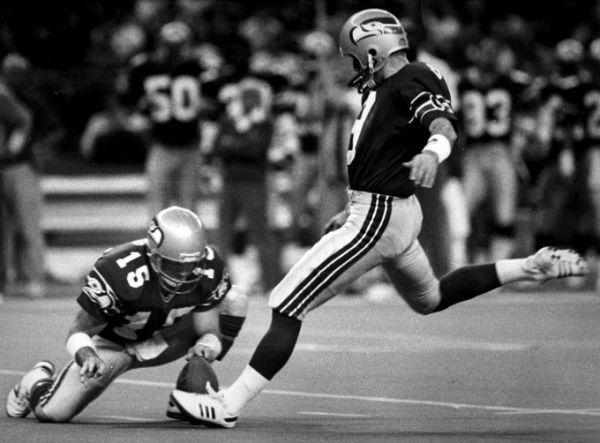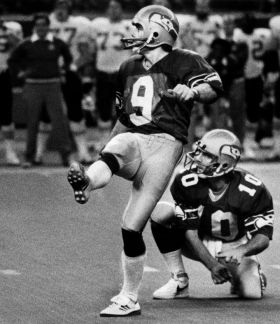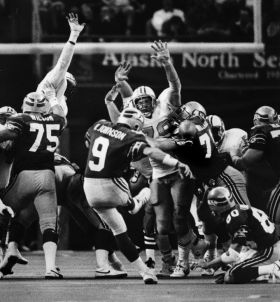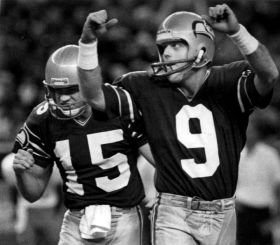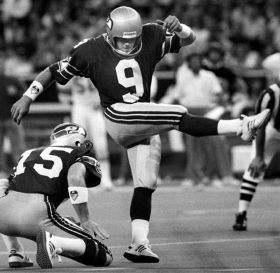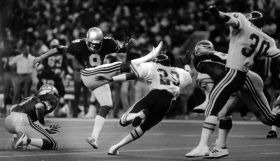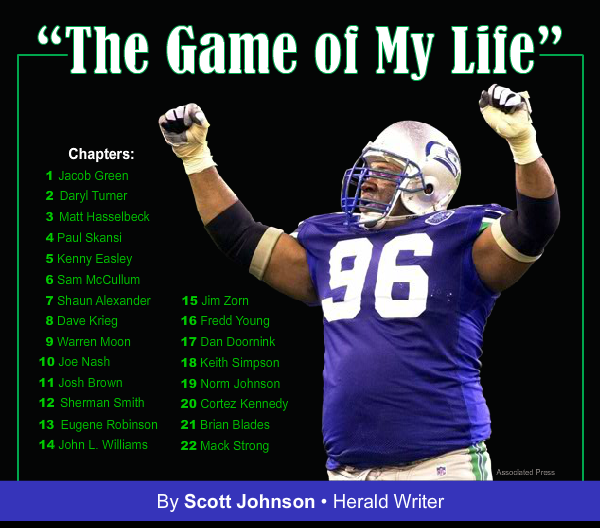While the 1983 NFL draft will forever be remembered for its deep pool of quarterbacks, the previous year's annual selection event can be looked back upon for its productivity at another position. In 1982, two drafted kickers with similar names came into the NFL and spent more than two decades making Pro Bowls and setting records. By the early part of the 21st Century, Morten Andersen and Gary Anderson were still kicking despite having already attained the status of immortals. Andersen broke Anderson's NFL record for career points in 2006, and the duo is included in just about any conversation that involves the greatest kicker in league history.
But the 1982 draft also missed on one kicker who would go on to put up numbers that were, as hard as it is to believe, almost as impressive as those of Andersen and Anderson.
After going undrafted in 1982, Norm Johnson made the Seahawks' roster and had such a long, productive career that he was the fourth-highest-scoring kicker in league history at the time of his 1999 retirement.
Three of the four highest scorers in NFL history came out of college the same year, and yet only two of them got drafted. Maybe Norm Johnson didn't have quite the expectations when he came into the league, but he proved to be just as productive.
Johnson kicked many game-winners among his 366 field goals over 18 NFL seasons. The one he remembers the most is the game-winning kick that almost never happened.
While countless athletes have seen injuries derail promising football careers, it was just that kind of misfortune that catapulted Norm Johnson's rise to NFL glory. As a sophomore tight end/defensive end on the Pacifica High School varsity team in Garden Grove, Calif., Johnson suffered a dislocated shoulder that required medical attention. He and the doctor got to chatting about Johnson's football career, and the doctor perked up when hearing of Johnson's duties as a kicker and punter.
"So," the doctor offered, "you must know Ben Agajanian."
[ The Herald ]
Only half curious, Norm Johnson admitted that he had never heard of Ben Agajanian. So the doctor gave him advice that would prove to be the most important of Johnson's future career: "Might want to look him up."
That tip, Johnson says 30 years later, is how one of the most decorated kickers in NFL history got a kick-start toward his future profession. Ben Agajanian was a former NFL kicker who gave clinics every Wednesday at nearby Long Beach State University. Johnson's father drove him to the clinic, and Johnson kept coming back.
Agajanian not only helped improve Johnson's kicking style, but also the mental part of the game. And although Johnson never found out for sure, he believes Agajanian might have eventually convinced UCLA football coach Terry Donahue to give Johnson a scholarship after his senior year of high school.
UCLA, which was Johnson's father's alma mater, was one of the few football powers that were willing to take a shot on the 6-foot-2, 190-pounder from Pacifica High. Other schools were offering incentives, like the opportunity to play more than one position, but that wasn't something that appealed to Johnson.
"I thought that if I got a scholarship as a kicker, I wouldn't have to bang my head against guys every day," said Johnson, who was also an all-conference tight end in high school. "Schools like Oregon said, 'You could even play some tight end for us.' But I was like: 'No, I'll be fine just being a kicker.' That's when I determined that I would really hone in and specialize. Looking back on it, that was certainly the right decision."
Johnson went on to have a decent career at UCLA, converting a modest 24 of 34 field goals over his final two seasons with the Bruins, but he didn't attract enough attention to get selected in the 12 rounds of the 1982 NFL draft. Part of the reason was that Michigan State's Morten Andersen and Syracuse's Gary Anderson, two college seniors that had NFL scouts drooling, were in the same draft class.
While Andersen and Anderson would go on to become the top two scorers in NFL history, there was a time when Johnson was not far behind. The undrafted kid from UCLA spent 18 seasons in the NFL, retiring as the No. 4 scorer in league history.
Not that anyone knew that in 1982, when Johnson signed a free-agent contract with the Seahawks even though former Pro Bowler Efren Herrera was already with Seattle. Johnson's choice of teams came down to the fact that he was comfortable with the city of Seattle, having visited there every summer of his childhood because his grandparents lived in a quaint part of town called Ballard.
Only after he signed with the Seahawks -- the following day, in fact – did Johnson get a call from his old pal Agajanian. The kicking instructor was calling to tell Johnson that he'd just gotten a job as special teams coordinator of the Chicago Bears, and he wanted Johnson to be his kicker.
"Had I known Ben was going up there, I would've been a shoo-in," Johnson said several years later. "He was going to groom me. My career would've been a lot different; I would've won the Super Bowl (with the Bears in 1986) and everything.
"At the time, I thought: Oh my goodness, did I make a huge mistake? But looking back, I was glad it turned out the way it did."
While Johnson had to tell Agajanian that he already had a job, albeit with a team that already had an established kicker, things did work out in the end. Herrera was in a nasty contract dispute with the Seahawks that year and didn't show up for the start of training camp. Johnson and six other free agents battled while Herrera held out, and when the veteran finally signed with a few days left in camp, Johnson was one of only two rookies still around. Herrera was eventually released, and Johnson won the job.
His first year in the NFL will be remembered for all the wrong reasons, as the 1982 season came to a temporary halt after just two games because of a players' strike. After two months, the players returned to the field to finish off a nine-game schedule. Johnson made 10 of 14 field goals and all but one of his extra points for the 4-5 Seahawks.
His second NFL season, in 1983, brought some high hopes for Seattle because the team had added veteran head coach Chuck Knox and rookie running back Curt Warner, who was selected with the third overall pick in the NFL draft. While the Seahawks got off to a decent start, going 6-4 in their first 10 games, everything came crashing back to earth with two consecutive losses in November. A 38-27 loss to AFC West rival Denver left the Seahawks with a 6-6 record and in a six-way battle for the AFC's lone wild-card playoff berth. As the Seahawks prepared for a Nov. 27 home game against Kansas City, it was apparent that a loss would probably knock Seattle out of the playoff picture.
But, thanks in large part to the most memorable game of Johnson's career, the Seahawks weren't going to go away.
Seahawks vs. Kansas City ChiefsNovember 27, 1983
as told by Norm JohnsonI don't recall a lot of games; there have only been a few that I can recall much of. But this one I can remember pretty well. We were in the Kingdome. The fans were into it. The year was exciting because Chuck Knox, a proven winner, came to town. We were still a young and fun team, but we had a new head coach and a fairly new general manager, Mike McCormack. So some things were starting to happen. And we had an exciting draft pick, Curt Warner. He was our No. 1 pick that year, the third pick in the entire draft. So there was some excitement around town. There was also some controversy that year because that's the year Dave Krieg took the reins from quarterback Jim Zorn.
Going into the Kansas City game, we knew we had a chance to have a winning season and had a chance to go to the playoffs for the first time in franchise history. The previous week, we had lost to Denver in a key AFC West game. That dropped us to 6-6 on the season, and things were starting to get desperate in terms of making the playoffs. After a loss to a division rival, you start getting desperate.
Going into the game, as we got to end of season and you go through all the mathematical equations of what-if, there were four teams that we needed to lose. And being on the West Coast, we already knew going into that game that those four teams already lost. That put us second for the wild card and made a playoff berth that much closer if we won that game.
It was an incredibly emotional game. There were some critical turnovers. Dave Krieg and Curt Warner fumbled an exchange at our 6-yard line, setting up one touchdown. A Krieg interception just before halftime set up another score. We had some bad turnovers, and were behind 28-14 at halftime. So things were looking somewhat dismal for the Seahawks.
But we scored the first 17 points of the second half to take our first lead of the game, at 31-28. It was an emotional roller coaster. Up and down, back and forth, a seesaw battle. Being such a high-scoring game, I had a lot of kickoffs. Curt Warner, who was awesome that year, finished the game with 207 yards. He was putting on a show.
So was Kansas City's quarterback, Bill Kenney. He threw for 311 yards and four touchdowns, and he scored two himself on quarterback sneaks.
It was quite an offensive game. There were some huge plays. Some fourth downs, crucial plays. There was Steve Largent's first pass, and Dave Krieg's first reception for a big play down to the 1-yard line in the fourth quarter. That set up Warner's third touchdown of the game and put us within 42-38.
On the next drive, Krieg hit Paul Johns for a touchdown to give us our second lead of the game, at 45-42.
But Kansas City came right back, scoring on a Kenney-to-Theotis Brown touchdown pass with 1:30 left in regulation. Kansas City kicker Nick Lowery came on to try and give the Chiefs a seven-point lead, but he missed the extra point to keep us within three, at 48-45, so we still had a chance to tie with a field goal instead of needing a touchdown.
We took over at our own 17, with just 1:26 remaining, and needed to get at least 45 yards to have a shot at overtime. Krieg hit Dan Doornink in the flat, and the running back picked up 18 yards. A couple of plays later, we moved the ball near midfield. But with only 27 seconds remaining, while staring at second-and-10, we needed a big play. And Krieg delivered, hitting 37-year-old Harold Jackson for a 29-yard completion over the middle.
We took two shots at the end zone, then I ended up kicking a 42-yard field goal with two seconds left to tie the game and send it into overtime. That was my first opportunity ever in the pros, at the end of a game, to tie it up and send us into overtime.
The Chiefs guessed wrong on the coin toss, and that allowed the Seahawks to get the ball. I remember before that coin toss thinking, with the defenses that are on the field today, whoever wins that coin toss is certainly going to win because neither defense could stop the other team. So we won the coin toss, and we received. We were all pretty excited about that because of the type of offensive day we were having.
The kickoff went to Zach Dixon, and he returned it 47 yards to the Kansas City 48-yard line. You talk about a big play. We're in this seesaw battle, we have the opportunity to receive the kickoff, and the return man gives us a chance to start our offense out near midfield.
It's Curt Warner right, Curt Warner left, and we're just marching down the field. He goes for 17 yards to the left, for five more to the right, and then he goes left again. We didn't even have to throw that drive.
I specifically remember standing back by the benches wondering if I was going to have another play. I was thinking: If you score a touchdown in overtime, do you still need the extra point, or do you just win by six? It was the first overtime game of my NFL career, so that's truly what was going through my mind: Am I going to need to kick an extra point?
So I was standing back by the Gatorade table with a cup in my hand, and we cross midfield. It was exciting; we were driving. Warner ran a couple more times, and it was third down. I'm just standing back there, with the Gatorade in my hand, taking it all in.
Then all of a sudden, I thought I heard somebody yell: 'Field goal!' So I stand up on my tippy toes and look over all the guys with the helmets, and I see this whole group of people running onto field. But it's third down, and we're just across midfield, so I'm thinking: That couldn't have been what I heard.
So I run up, and I'm staring at Chuck Knox. Chuck's looking up at the clock. I tapped him and said, 'Chuck, did you just call for a field goal?'
And he turns and looks at me, with these huge eyes, and he realizes he just sent the field goal team on without his kicker. So he yells, 'Get out there!'
I run out there, and they've already broken the huddle. I barely had time to line up. Blair Bush, who was the best long-snapper I've ever seen, had come off the field four times already with a torn-up knee. But he swallowed the pain and was on the field just to long-snap on the field goals. So I get out there with just enough time to line up, kick it, look up and watch ball go through. We win, elation, and I hardly knew what happened. That's how that game ended for me.
I specifically remember going up to Chuck afterward and saying, 'You didn't call field goal, did you? It was third down, and Curt Warner was running for five yards right, for five yards left.'
He said he'd seen too many times where teams are piddling around, and he didn't want to take a chance waiting for fourth down. Luckily, he had the confidence in me that he decided that when we were in field-goal range, we were just going to kick it.
That was my third successful 42-yarder of the game. And that's how it ended. We won 51-48 in what, for years, was the third-highest-scoring game in NFL history. It was early in my career, a big game for us. We ended up making it to the playoffs and making it all the way to the AFC championship game.
Norm Johnson played seven more seasons for the Seahawks, becoming the franchise's all-time leader in field goals (159) and points (600). He will still hold team records in both categories through the end of the 2011 season, 21 years after his career with the Seahawks was finished.
Johnson went to the Atlanta Falcons in 1991 before the Pittsburgh Steelers signed him four years later. After winning his first two playoff games as a member of the Seahawks, Johnson had to wait another 12 years before tasting postseason success again. His Steelers went to Super Bowl XXX after the 1995 season, losing 27-17 to the Dallas Cowboys. He went back to the playoffs in 1996 and 1997, played one more season with Pittsburgh, and then finished his 18-year NFL career with the Philadelphia Eagles in 1999.
When Johnson retired, only George Blanda and the two kickers from the Class of '82 -- Andersen and Anderson – had scored more points in the NFL than Johnson's 1,736. Asked how he was able to sustain such a long, productive career, Johnson struggled to find an explanation.
"I think my background in sports, being one of the top guys on the team, helped build my confidence in myself and my confidence in the mental game," said Johnson, who eventually moved to Kitsap County and got into real estate. "I think that's a big part of why I hung around."
Oh, and there was one more reason.
Ben Agajanian.
"I didn't keep in contact with him a lot during my career, but I should have," Johnson said. "We didn't have a real close relationship, but we should have."
So did he ever tell Agajanian how important he was to Johnson's career?
Years later, Johnson had not.
"I don't think that's ever come out of my mouth," Johnson said. "But I think he knows."

